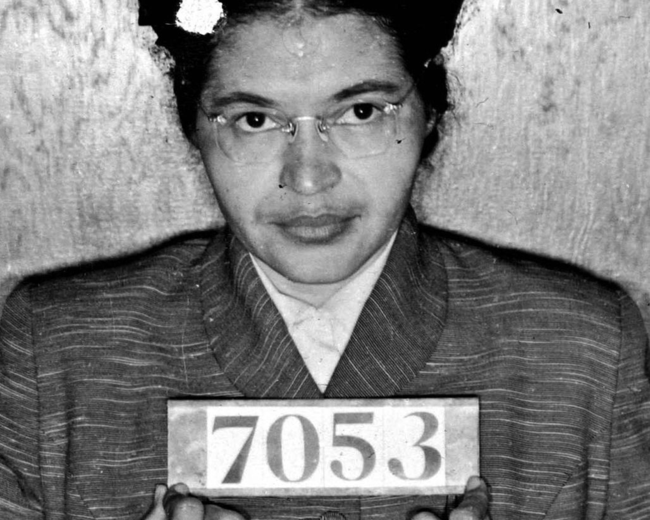On Thursday December 1, 1955, a department store seamstress in Montgomery, AL, was on her way home from work by bus. Quiet, well-mannered and impeccably dressed, Rosa Parks was seated on a crowded bus with three others in a row designated for “colored” passengers. When a White man boarded the bus, that row immediately became seats for Whites only. When the bus driver ordered Rosa and three other Black passengers to stand and give up their seats, she refused. Rosa was arrested, photographed, fingerprinted and was refused a phone call and water. Eventually, her husband and neighbors bailed her out at 9:30 that night.
News of Rosa’s arrest spread quickly through the Montgomery African American community and the Montgomery Improvement Association was formed to organize a response. Led by local ministers Ralph Abernathy and Martin Luther King, Jr. a one-day bus boycott by the 40,000 African American riders took place on December 5th, the day of Rosa’s trial.
Rosa was quickly found guilty and fined. She was not alone in her frustration with the treatment of African Americans on Montgomery transportation. While she appealed her criminal conviction, and after Dr. King’s home was bombed, five other Alabama women brought a federal suit, Browder v Gayle, claiming that the bus segregation violated their 14th Amendment Rights. The one-day boycott became a remarkable 382-day highly organized ride-sharing enterprise to boycott the bus system.
Rosa and her husband, Raymond, were already members of the NAACP and closely followed other well-known civil rights cases. Rosa and her family decided to go to trial despite intimidation and death threats. Rosa lost her department store job, and her husband lost his job as a barber at a local air force base.
In December 1956, the U.S. Supreme Court opinion in Browder v Gayle banned all segregation on public transportation. Still unable to find work, Parks and her husband left Montgomery in 1957, first traveling to Virginia and later to Detroit, Michigan. In 1999, the U.S. Congress recognized Parks as the “Mother of the Civil Rights Movement.” Rosa Parks died in Detroit in 2005 at the age of 92.

